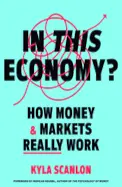
In This Economy? - by Kyla Scanlon
ISBN: 0593727878Date read: 2024-09-05
How strongly I recommend it: 5/10
(See my list of 430+ books, for more.)
Go to the Amazon page for details and reviews.
Economics explained for non-economists. Highly recommended if that’s what you want.
my notes
Economics is the study of change: how to handle change and how to predict change.
What goes too long unchanged destroys itself.
The forest is forever because it dies and dies and so lives.
What is economics?
The ultimate tool for decoding our collective decisions.
Human behavior, a guide to navigating the complex networks of supply, demand, and market forces.
Perspectives that guide our societal wants and needs.
Our brains are built to process the negative first because it helps us plan for future survival.
There’s a feedback loop between what people think and what actually ends up happening, which in turn changes the way people think.
The blurred line between perception and reality:
Is the stock price high because the company is growing, or is the company growing because the stock price is high?
If people believe that certain changes in the money stock will cause changes in the rate of inflation, that may well happen, because their expectations will be built into their long-term contracts.
Consumer sentiment is everything because it drives consumer spending, the central driver of GDP growth.
High gas prices impact everyone.
We are swayed by prices, and if prices are high, we feel bad.
If we feel bad, the economy feels bad.
Bright neon signs on every street corner remind us of how expensive it is to be alive.
High gas prices do not a recession make. But they sure can feel like one.
History is not the past - it is the method we have evolved of organising our ignorance of the past. It’s the record of what’s left on the record.
Evidence is always partial.
Facts are not truth, though they are part of it.
Information is not knowledge.
Expected inflation is self-fulfilling.
If people expect it to continue, they might raise prices for their business or ask for raises at their jobs, fueling continuing price increases.
The hardest thing in the world is simplicity.
Money has always been a meme.
The dollar is an inflation hedge.
All the talk about the United States being a really stable place is essentially a big red arrow pointing to the power of the U.S. military and its allies.
The dominant denomination of cross-border liabilities.
The U.S. foreign policy establishment is always working to defend the value of the U.S. dollar.
If a bottle of aged grape piss can sell for thousands of dollars, what other trillion dollar industries and worldviews are constructed on a foundation of mass preference falsification and status driven self-deception? Almost all of them?
Acquire loving kindness and scientific impartiality.
Port truckers’ jobs require them to line up for hours to pick up cargo, and they’re paid only when they move it.
The entire system is built around free labor from truck drivers as they wait for containers.
It’a a completely misaligned incentive structure.
In 2020, all the small details of our supply chains were highlighted: railroads, ports, and cranes; how long ships spend at the dock and the touch points for the RTG/RMG container crane operators, truck drivers, and clerks; how long containers sit without drivers available to drive them away; maintenance of yard equipment; package unloading. Each of these factors has a cascading, knock-on effect.
As resources get cheaper, we find progressively dumber uses of them.
We have gotten very good at taking raw materials out of the earth and making things out of them.
However, the cost of repairing things (labor) has skyrocketed.
Hence the “I’ll buy cheap things because they’re cheap rather than repairing those I already have” mindset.
GDP is the total market value of all finished goods and services produced within a country’s borders.
It serves as a comprehensive scorecard of a country’s economic health, measuring both
(1) the total income in the economy
(2) the total expenditure on what an economy produces (goods and services).
GDP = C + G + I + NX
C = consumption
G = government purchases
I = investment
NX = net exports